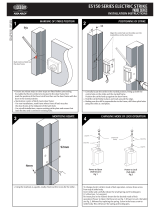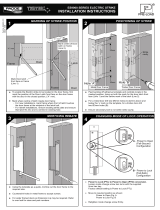Page is loading ...

24
ES100/ES110 - 121 - 0316
To change electric strike’s mode of lock operation, remove brass screw from
top of strike body.
Invert strike and carefully release the small spring and 3 locking pins
(2 x Short pin, 1 x Long pin).
Re-insert pins in in the manner shown for the desired mode of lock
operation (Power to Open / fail Secure): see Fig. 1;
(Power to Lock / fail safe): see Fig. 2, followed by replacing the spring.
Screw in the brass screw to strike body. This will secure the spring and
locking pins.
ES100 /ES110 SERIES ELECTRIC STRIKE
INSTALLATION INSTRUCTIONS
Hole ‘B’ for
timber frame
Hole ‘A’ for
metal frame
Small End of
spring
Short Pins
Long Pin
Short Pins
Long Pin
• Peel backing off adhesive template and centrally locate in the
marked position, lining up both the mark for the door latch front
face (Line 1) and the centre mark of the latch (Line 2).
• For the metal door drill two Ø5mm holes (A) 24mm above and
below the “X” mark on the template, for a timber door drill
two Ø3mm holes (B).
• Ensure secondary bolt is not within the strike cavity.
• To enable the Electric strike to be located in the door frame, first
mark the position of the Door Latch front face on the door frame
with the door in the closed position, (”X”mm).
• Mark where centre of latch meets door frame:
- For new installations, mark frame where front of latch touches
the door frame at the midpoint of the latch bolt.
- For retrofit installations, remove existing strike plate and ensure
the latch fits into and is centred in existing hole.
CHANGING MODE OF LOCK OPERATION
MORTICING REBATE
POSITIONING OF STRIKE
MARKING OF STRIKE POSITION
• Using the template as a guide, mortice out the door frame to the
required size.
• Countersink holes in metal frame to accept screws.
Door
Frame
Door
Frame
Latch
Mark Door latch
front face on frame
(Line 1).
“X”
mm
Mark centre of Door
latch on frame
(Line 2).
100A series - 17mm
110A series - 20mm
100B series - 17mm
110B series - 20mm
100B series - 17mm
110B series - 20mm
100A series - 17mm
110A series - 20mm
Power to Open
(Fail-Secure)
Fig 1
Power to Lock
(Fail-Safe)
Fig 2

ASSA ABLOY Australia Pty Limited, 235 Huntingdale Rd, Oakleigh, VIC 3166 ABN 90 086 451 907 ©2016
Keeper
edge
The installation of a latch guard is recommended on outward opening
external doors.
• For metal door frames fit door mounting brackets.
• Once door frame preparation is compelte, temporarily fit strike into
door frame to check for interference. Check that the door closes
smoothly and that the latch extends past the strike keeper.
• When strike operates correctly with latch, remove strike from
mortice and connect wiring.
• Refit strike and secure, making sure no wires are being crushed.
• Check both mechanical and electronic operation works correctly.
Deadlatching
pin
TUBULAR LATCH OPERATION
To ensure deadlatching, ensure
that the deadlatching pin is
depresed by the edge of the
keeper when the door is closed.
An ASSA ABLOY Group brand
ELECTRICAL SPECIFICATION
CHECKING FUNCTIONASSEMBLING STRIKE
CAUTION! - Incorrect supply voltage may cause damage not covered by warranty.
Please check supply voltage with a suitable meter to ensure it is within ± 15% of the nominal
voltage shown above with the strike powered.
DO NOT OIL OR LUBRICATE
24V DC 125mA 12V DC 250mA
Blue Red
Black
White
Blue
Red
White
Black
•
• •
•
•
•
•
•
Blue and Black to Power Supply.
Red and White joined together.
Red and Black joined and to Power Supply.
Blue and White joined and to Power Supply.
•
•
15mm Extension Lip
P/No. 220110 - 502
25mm Extension Lip
P/No. 220110 - 503
50mm Extension Lip
P/No. 220110 - 504
/




